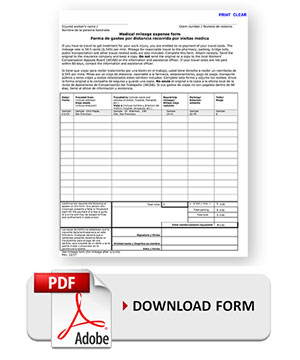Medical Mileage Expense Forms
California is the nation's most expensive gasoline market, economists say, due to taxes, other costs and environmental regulations. And it's only going to get worse. As we spend more and more time idling in increasingly snarled traffic, gas tanks need to be filled more frequently.
Travel expenses, including gasoline costs and parking fees, add up quickly, and if you're working within a tight budget, as is the case with many injured workers, every dollar counts. This is precisely why it's important to keep track of the mileage and related expenses pertaining to your workers' compensation claim.
What's Included in the Mileage "Package"
Workers injured on the job are entitled to reimbursement for medical mileage, which includes the transportation expenses to and from the following:
- Medical treatment/evaluations
- Physical therapy
- Pharmacy
California has a relatively lenient medical mileage policy compared to other states, but nothing's a given. An experienced workers' compensation attorney can help if the insurance carrier questions the submitted expenses.
Constantly Changing Rates
The rate at which mileage reimbursement is paid varies. Per the Labor Code, "it is dependent upon the mileage rate adopted by the Director of the Department of Personnel Administration pursuant to Section 19820 of the Government Code, whichever is higher, plus any bridge tolls."
As you can see by the following chart, the reimbursement rate from July of 2006 to the present has constantly changed.
| July 1, 2006 to December 31, 2006 | $.445/mile |
| January 1, 2007 to December 31, 2007 | $.485/mile |
| January 1, 2008 to June 30, 2008 | $.505/mile |
| July 1, 2008 to December 31, 2008 | $.585/mile |
| January 1, 2009 to December 31, 2009 | $.55/mile |
| January 1, 2010 to December 31, 2010 | $.50/mile |
| January 1, 2011 to June 30, 2011 | $.51/mile |
| July 1, 2011 to December 31, 2012 | $.555/mile |
| January 1, 2013 to December 31, 2013 | $.565/mile |
| January 1, 2014 to December 31, 2014 | $.56/mile |
| January 1, 2015 to December 31, 2015 | $.575/mile |
| January 1, 2016 to December 31, 2016 | $.54/mile |
| January 1, 2017 to December 31, 2017 | $.535/mile |
| January 1, 2018 to December 31, 2018 | $.545/mile |
| January 1, 2019 to December 31, 2019 | $.58/mile |
| January 1, 2020 to December 31, 2020 | $.575/mile |
| January 1, 2021 to December 31, 2021 | $.56/mile |
| January 1, 2022 to December 31, 2022 | $.585/mile |
| January 1, 2023 to December 31, 2023 | $.655/mile |
| January 1, 2024 and continuing. | $.67/mile |
The rates in the above chart are to be used for transportation during the period listed. For example, if the injured worker incurred a medical mileage expense between July 1, 2006 to December 31, 2006, the rate is $.445/mile.
You can click on the dates in the above chart and link to a Medical Mileage Expense Form for that specific period of time, which you can print and use to request reimbursement.
How Do I Get Reimbursed?
As is the case with everything involving an on-the-job injury, it is imperative that you keep detailed notes of your travel expenses related to the medical treatment for your workplace injury. Be sure to keep a copy of these records for your own file, and submit your mileage reimbursement requests on a timely basis (i.e., every 90 days) to facilitate prompt reimbursement.
How Long Will it Take to Get Reimbursed?
According to case law, the insurance company has 60 days from receipt of the request to pay or dispute the mileage reimbursement request.Medical mileage reimbursement is your right as an injured worker in California. It is up to you to take full advantage of this benefit in the state's workers' compensation system.
Mileage Documentation Is Key
As is the case with everything involving an on-the-job injury, it is imperative for you, the injured worker, to keep detailed notes of your travel expenses related to the medical treatment for your workplace injury. Be sure to keep a copy of these records for your own file, and submit your mileage reimbursement requests on a timely basis (i.e., every 90 days) to facilitate prompt reimbursement. Medical mileage reimbursement is your right as an injured worker in California. It is up to you to take full advantage of this benefit in the state's workers' compensation system.


